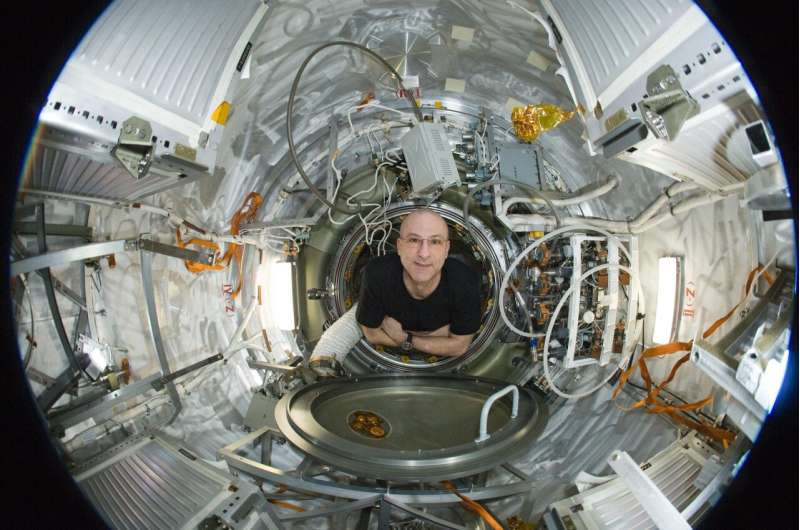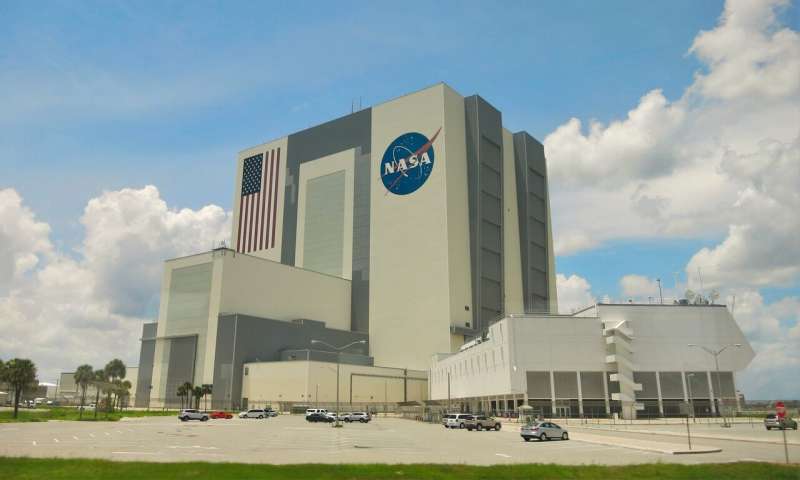Astronaut's 'science of opportunity' experiments help prepare for launch to the International Space Station
Wednesday, 04 September 2024 18:57
Science ideas are everywhere. Some of the greatest discoveries have come from tinkering and toying with new concepts and ideas. NASA astronaut Don Pettit is no stranger to inventing and discovering. During his previous missions, Pettit has contributed to advancements for human space exploration aboard the International Space Station resulting in several published scientific papers and breakthroughs.
Pettit, accompanied by cosmonauts Alexey Ovchinin and Ivan Vagner, will launch to the orbiting laboratory in September 2024. In preparation for his fourth spaceflight, read about previous "science of opportunity" experiments Pettit performed during his free time with materials readily available to the crew or included in his personal kit.
Space Force defends plan to buy smaller, cheaper satellites to reinforce GPS
Wednesday, 04 September 2024 18:47

Boeing will fly its empty capsule back to Earth soon. Two NASA astronauts will stay behind
Wednesday, 04 September 2024 17:45Boeing will attempt to return its problem-plagued capsule from the International Space Station later this week—with empty seats.
NASA said Wednesday that everything is on track for the Starliner capsule to undock from the space station Friday evening. The fully automated capsule will aim for a touchdown in New Mexico's White Sands Missile Range six hours later.
NASA's two stuck astronauts who flew up on Starliner will remain behind at the orbiting lab. They'll ride home with SpaceX in February, eight months after launching on what should have been a weeklong test flight. Thruster trouble and helium leaks kept delaying their return until NASA decided that it was too risky for them to accompany Starliner back as originally planned.
"It's been a journey to get here and we're excited to have Starliner return," said NASA's commercial crew program manager Steve Stich.
NASA's Butch Wilmore and Suni Williams will close the hatches between Starliner and the space station on Thursday. They are now considered full-time station crew members along with the seven others on board, helping with experiments and maintenance, and ramping up their exercise to keep their bones and muscles strong during their prolonged exposure to weightlessness.
To make room for them on SpaceX's next taxi flight, the Dragon capsule will launch with two astronauts instead of the usual four.
Slow Burn: How Starliner’s crewed test flight went awry
Wednesday, 04 September 2024 12:00
The artificial divide between the space and geospatial sectors
Wednesday, 04 September 2024 12:00
European greenhouse gas emissions decline but land stores weaken
Wednesday, 04 September 2024 11:50
According to recent research, Europe’s net greenhouse gas emissions have decreased by around 25% since the 1990s. While this is good news, the study also revealed a weakening in the capacity of land and vegetation to absorb and store atmospheric carbon.
ESA launches NTN forum to advance Space for 5G & 6G
Wednesday, 04 September 2024 11:38
Connectivity is the invisible fabric that binds our increasingly digital world together. Most of us have experienced the disruptions caused by slow internet or its absence in remote areas. ESA acknowledges the importance of 5G and 6G technologies in ensuring reliable and comprehensive connectivity across Europe and beyond.
Atlas sets course to triple sales after raising $15 million
Wednesday, 04 September 2024 11:00

Audit warns costs for NASA's new Artemis launcher could balloon to $2.7 billion
Wednesday, 04 September 2024 10:50
NASA's second mobile launcher needed for future missions in the Artemis program is already years late and millions over budget, and NASA's Office of the Inspector General warns it could get even worse.
In an audit released last week, the OIG said the mobile launcher 2 (ML-2), which was originally awarded a $383 million contract in 2019 for delivery by 2023 but only began construction at Kennedy Space Center last August, could continue to see ballooning costs and delays, so that once delivered it will cost taxpayers more than $2.7 billion and not be ready until 2029.
"Despite progress since our last report, NASA has struggled to develop a reliable cost and schedule estimate for the ML-2 project and incentivize significant improvement in contractor performance," reads the OIG report. "Given the importance of ML-2 for future Artemis missions, it is critical that NASA effectively manage the project to control cost increases and avoid further schedule delays."
The first Artemis launch took place in 2022 on the existing mobile launcher (ML-1), but ML-2 is needed to support a larger version of the Space Launch System rocket that will be used beginning with the Artemis IV mission.
Benchmark wins $4.9 million award for ASCENT propulsion systems
Wednesday, 04 September 2024 10:00

Sierra Space completes acoustics tests of Dream Chaser cargo module
Wednesday, 04 September 2024 09:53

NASA's mini BurstCube mission detects its first gamma-ray burst
Tuesday, 03 September 2024 20:14
The shoebox-sized BurstCube satellite has observed its first gamma-ray burst, the most powerful kind of explosion in the universe, according to a recent analysis of observations collected over the last several months.
"We're excited to collect science data," said Sean Semper, BurstCube's lead engineer at NASA's Goddard Space Flight Center in Greenbelt, Maryland. "It's an important milestone for the team and for the many early career engineers and scientists that have been part of the mission."
The event, called GRB 240629A, occurred on June 29 in the southern constellation Microscopium. The team announced the discovery in a GCN (General Coordinates Network) circular on August 29.
BurstCube deployed into orbit April 18 from the International Space Station, following a March 21 launch.






